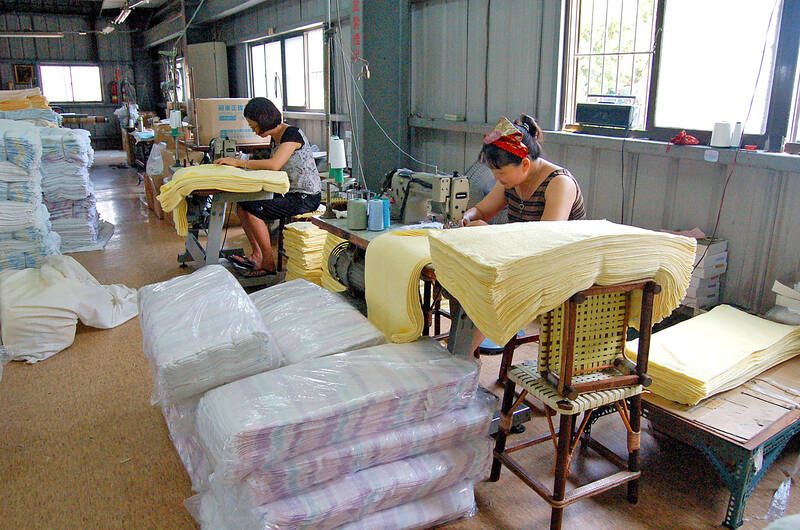The Ministry of Finance is extending its anti-dumping tariffs on toweling products from China for five years, as exporters continue to sell their goods at unfairly low prices in Taiwan, harming the local industry, it said last week.
The Customs Administration extended the anti-dumping tariffs of 29.72 percent on bath towels, pillow covers, napkins, tablecloths, footpads and semi-finished products sold by Chinese exporters, the ministry said in a statement on Friday.
The extension of the punitive tariffs, which were in effect from Dec. 21, 2017, to Dec. 20, 2022, started on Friday last week and are to run through Dec. 28, 2028, the agency said.

Photo: Liao Shu-ling, Taipei Times
The decision to extend the tariffs came after the ministry completed a third sunset investigation into the trading practices of Chinese exporters of toweling products, it said.
It and the Ministry of Economic Affairs agree the materially adverse effects that Chinese towel exporters’ unfair practices have had on Taiwan’s towel industry has not ended.
There is no evidence that the continued anti-dumping tariffs would have a negative effect on Taiwan’s economy, the Ministry of Finance said.
It imposed anti-dumping tariffs on China-made toweling products for the first time in June 1, 2006, with the tariff set at 204.1 percent for five years.
After its first sunset investigation in 2011, the ministry extended the tariff for another five years to Dec. 19, 2016.
Following the second sunset probe, it reinstated the tariff again for five years, but reduced it to 29.72 percent.
Over the 10 years to the end of November last year, Taiwan collected more than NT$103 million (US$3.34 million) in anti-dumping taxes from Chinese towel exporters, finance ministry data showed.
However, the tariff failed to reduce imports of toweling products from China over the past five years.
In the first 11 months of last year, imports of toweling product from China topped NT$21 million, up from about NT$6 million in 2019, the data showed.

MULTIFACETED: A task force has analyzed possible scenarios and created responses to assist domestic industries in dealing with US tariffs, the economics minister said The Executive Yuan is tomorrow to announce countermeasures to US President Donald Trump’s planned reciprocal tariffs, although the details of the plan would not be made public until Monday next week, Minister of Economic Affairs J.W. Kuo (郭智輝) said yesterday. The Cabinet established an economic and trade task force in November last year to deal with US trade and tariff related issues, Kuo told reporters outside the legislature in Taipei. The task force has been analyzing and evaluating all kinds of scenarios to identify suitable responses and determine how best to assist domestic industries in managing the effects of Trump’s tariffs, he

TIGHT-LIPPED: UMC said it had no merger plans at the moment, after Nikkei Asia reported that the firm and GlobalFoundries were considering restarting merger talks United Microelectronics Corp (UMC, 聯電), the world’s No. 4 contract chipmaker, yesterday launched a new US$5 billion 12-inch chip factory in Singapore as part of its latest effort to diversify its manufacturing footprint amid growing geopolitical risks. The new factory, adjacent to UMC’s existing Singapore fab in the Pasir Res Wafer Fab Park, is scheduled to enter volume production next year, utilizing mature 22-nanometer and 28-nanometer process technologies, UMC said in a statement. The company plans to invest US$5 billion during the first phase of the new fab, which would have an installed capacity of 30,000 12-inch wafers per month, it said. The

Taiwan’s official purchasing managers’ index (PMI) last month rose 0.2 percentage points to 54.2, in a second consecutive month of expansion, thanks to front-loading demand intended to avoid potential US tariff hikes, the Chung-Hua Institution for Economic Research (CIER, 中華經濟研究院) said yesterday. While short-term demand appeared robust, uncertainties rose due to US President Donald Trump’s unpredictable trade policy, CIER president Lien Hsien-ming (連賢明) told a news conference in Taipei. Taiwan’s economy this year would be characterized by high-level fluctuations and the volatility would be wilder than most expect, Lien said Demand for electronics, particularly semiconductors, continues to benefit from US technology giants’ effort

‘SWASTICAR’: Tesla CEO Elon Musk’s close association with Donald Trump has prompted opponents to brand him a ‘Nazi’ and resulted in a dramatic drop in sales Demonstrators descended on Tesla Inc dealerships across the US, and in Europe and Canada on Saturday to protest company chief Elon Musk, who has amassed extraordinary power as a top adviser to US President Donald Trump. Waving signs with messages such as “Musk is stealing our money” and “Reclaim our country,” the protests largely took place peacefully following fiery episodes of vandalism on Tesla vehicles, dealerships and other facilities in recent weeks that US officials have denounced as terrorism. Hundreds rallied on Saturday outside the Tesla dealership in Manhattan. Some blasted Musk, the world’s richest man, while others demanded the shuttering of his